Building an Employer Brand
April 3, 2025
 Building an Employer Brand
Building an Employer Brand
Organizations, today, are working towards talent optimization. They have come to realize that creating a standout employer brand is essential to have ‘people advantage’. Talent and marketing are the new sides of a branding coin. It has become essential for organizations to position themselves in an attractive way and communicate the company identity and work…
 Employer Branding in Regard to Career Aspirations of Males and Females
Employer Branding in Regard to Career Aspirations of Males and Females
Women make a significant part of modern organizations. Their focus has shifted from traditional, seasonal and female-oriented job roles to general or so called ‘male-oriented’ job roles. Their participation in the workforce cannot be ignored. Rather young women are surpassing men in almost all aspects of employment. However, men and women, despite obtaining similar education,…
 Using Social Media for Employer Brand Promotion and Talent Attraction
Using Social Media for Employer Brand Promotion and Talent Attraction
Until a few years ago, most talent acquisition experts had declared social media as not-so useful for promoting their employer brand and attracting talent. They continued to deploy more traditional channels to create and widen the talent pool for their organizations. And they also kept whining about the increasing talent gap. While social media has…
Welcome to the talent economy!
With the changing perception of organizations and increasing appreciation for talent, it won’t be wrong saying that we have transported into the talent economy. Though the shift has been taking place for many decades, the last decade, however, altered the scenario seemingly in the blink of the eye.
The C-suite executives have been trying to make talent attraction and acquisition a corporate strategy. When the business world is driven by the ‘speed’ of innovation and action, talent is seen as a critical asset. Therefore, it’s become of utmost importance for executives to narrow down the schism between talent attraction and employer branding, and make it a corporate strategy rather than just an HR strategy.
Here, let’s take a look at the current state of employer branding:
PwC’s annual CEO survey reveals that CEOs worry more about finding the talent with the right skills year after year. In 2003, 58% said that skill availability was a serious concern. This percentage rose to 63% in 2014. The skill gap in certain fields is really high, which is a cause of an anxiety for organizations.
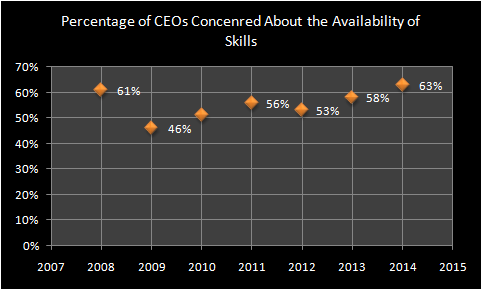
In addition to this, the study also found that 77% of CEOs had plans to modify their strategy for managing the talent for that financial year. In 2014, 93% of CEOs admitted that there was a serious need to change their employer branding strategy. However, 61% of CEOs have not taken any steps in this direction.
This shows that employer branding cannot be just an HR strategy. It needs to included in the corporate strategy and managed in the same way as finances are managed and measured. The next five years are going to be tougher than ever. If we go by the current trends, it won’t be difficult anticipating that there would be a pressing need for the talent with the right skills by the end of this decade.
Though the leaders envision change in their employer branding strategy, but there are varied opinions regarding who’s accountable for it. Who is responsible and takes ownership for employer branding activities? Whether is it owned by CEOs or HR?
Here’s what PwC’s study reveals:
It is difficult to clearly state why there is such variability when it comes to taking ownership of employer branding. However, the report shows that HR executives feel unprepared to take the responsibility.
A large percentage CEOs also don’t think that HR is prepared to capitalize on the recent trends in talent market. 9% say that HR is not at all prepared while 34% believe that HR is prepared. The most probable reasons for this include:
In order to establish a strong employer brand, more co-operation is required. Typically, CEOs haven’t felt the need to involve HR in decision making and branding at a deeper level.
We have already discussed the reasons for this. HR has never been mainstream. It’s just considered as a support function. And it is this attitude that needs to be changed. Only then, an organization can be successful in its employer branding efforts. It needs a closer co-operation from C-suite, stakeholders, HR strategists and talent acquisition experts.
A study discloses what all the parties think about whether or not there is a need for closer co-operation for employer branding:
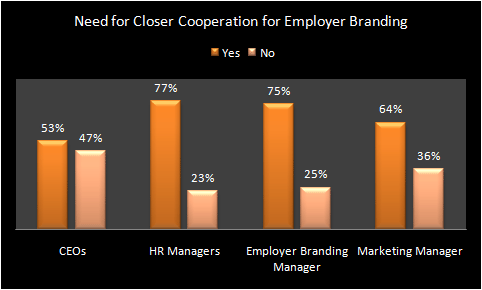
Most organizations are concerned about meeting short-term employer branding objectives. They are not ready for investing in long term initiatives. There is very small number of companies that are focusing on long term goals. The findings are:
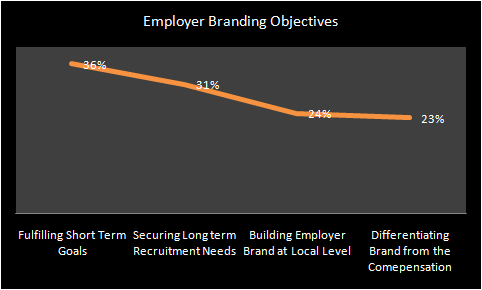
Although most employers look to fulfill their short term recruitment objectives from their employer brand, however, it is also clear that none of these objectives have received more than 1/3rd of votes. This is because the organizations are unable to prioritize their employer branding objectives. The reasons being:
But the scenario is changing and more and more C-suite level and managers and executives understand the importance of employer branding and prioritizing objectives to beat the competition.
How organizations invest in employer branding shows their commitment towards it. Typically, their efforts are directed more towards external rather than internal activities. This means that they focus less on the well being and overall satisfaction of their existing employees rather than driving branding activities for potential talent.
The organizations spend a major chunk of their budget on external marketing and branding activities. But it is equally important to focus on the experience of existing employees. Striking a balance is important.
The employer branding budget must be carefully divided among internal and external branding activities. The need is to take a unified approach and align employee and consumer branding. A study reveals that 82% of marketers think that there is a connection between the employer and consumer brand and only 19% of executives think that their customer and employer brands are same.
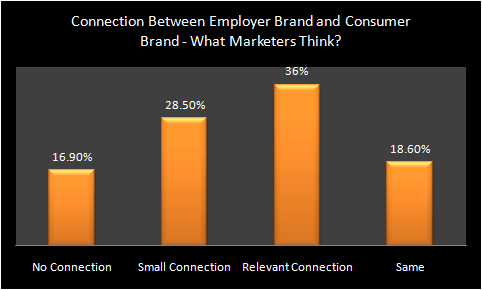
Companies like Google and RMSI make sure to offer an excellent experience to their employees. This approach helps them turn their people into their brand ambassadors. Their employees go on record explaining their wonderful experience with the company, which in turn, incites the interest of industry talent to work with them. Plus, it drives higher customer engagement and loyalty.
Without question, talent attraction and retention is critical to survival and growth. Employer branding currently seems important. However, one decade down the line, it may become a standard. It’s important to have a strategy in place – a combined strategy for employer brand and consumer brand. Currently, only 16% organizations have combined strategy.
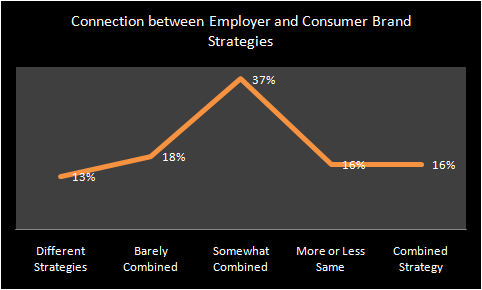
It’s clear that:
Your email address will not be published. Required fields are marked *